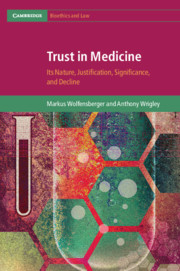Book contents
- Trust in Medicine
- Cambridge Bioethics and Law
- Trust in Medicine
- Copyright page
- Dedication
- Contents
- Figures
- Tables
- Preface
- Acknowledgements
- A Note on Usage
- Part I Introduction
- 1 Introduction
- 2 Empirical Evidence for the Decline of Trust
- Part II The Nature of Trust
- Part III Justification of Trust
- Part IV Significance of Trust
- Part V The Decline of Trust
- Part VI Perspectives
- References
- Index
- Series page
2 - Empirical Evidence for the Decline of Trust
from Part I - Introduction
Published online by Cambridge University Press: 19 August 2019
- Trust in Medicine
- Cambridge Bioethics and Law
- Trust in Medicine
- Copyright page
- Dedication
- Contents
- Figures
- Tables
- Preface
- Acknowledgements
- A Note on Usage
- Part I Introduction
- 1 Introduction
- 2 Empirical Evidence for the Decline of Trust
- Part II The Nature of Trust
- Part III Justification of Trust
- Part IV Significance of Trust
- Part V The Decline of Trust
- Part VI Perspectives
- References
- Index
- Series page
Summary
“Most empirical studies on trust examine the influence of certain variables (such as age, sex, education, or ethnicity) on trust at a specific moment in a specific segment of the population. However, only data collected from a representative sample of the general population over an extended period (longitudinal data) can reasonably tell us whether overall trust has declined or not. In this chapter, the authors present the two best longitudinal studies. Both come from opinion poll institutions: one from the United States (Harris Poll®), the other from the United Kingdom (Ipsos MORI®). The results of both studies are analysed and presented in graphic form. This involves a short critical analysis as to how the seeming differences between the studies are, in effect, due to methodological differences and disappear once these differences are taken into account. Although the data are fairly limited, there is still sufficient empirical evidence to suggest that trust (albeit a folk understanding of what trust is) in physicians has declined across Western countries, such as the United Kingdom and the United States, since the 1960s.
- Type
- Chapter
- Information
- Trust in MedicineIts Nature, Justification, Significance, and Decline, pp. 11 - 18Publisher: Cambridge University PressPrint publication year: 2019

